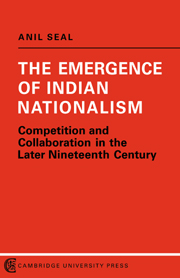Book contents
- Frontmatter
- Contents
- List of Maps and Tables
- Preface
- Abbreviations
- India: British Provinces and Native States
- 1 Political India
- 2 The Political Arithmetic of the Presidencies
- 3 The Rewards of Education
- 4 The Policies of the Rulers
- 5 The Politics of the Associations
- 6 The Politics of Union
- 7 The Muslim Breakaway
- 8 Perspectives
- Appendices
- Glossary
- Biographical Notes
- Bibliography
- Index
3 - The Rewards of Education
Published online by Cambridge University Press: 23 November 2009
- Frontmatter
- Contents
- List of Maps and Tables
- Preface
- Abbreviations
- India: British Provinces and Native States
- 1 Political India
- 2 The Political Arithmetic of the Presidencies
- 3 The Rewards of Education
- 4 The Policies of the Rulers
- 5 The Politics of the Associations
- 6 The Politics of Union
- 7 The Muslim Breakaway
- 8 Perspectives
- Appendices
- Glossary
- Biographical Notes
- Bibliography
- Index
Summary
Both the hopes and fears of the educated were concerned with the chances of gaining employment at what they thought was the right level. Some avenues were barred to them outright, and others offered meagre prospects. The army would not have them as officers. Caste restrictions and lack of capital stood between them and any business career better than clerking. In 1882 the Education Commission noticed that ‘Some engage in trade. They are, however, comparatively few in number. For commerce needs capital, and hereditary aptitude for business, neither of which is usually possessed in any sufficient degree by those educated in our colleges.’ In a survey of the careers of over 1,700 Calcutta graduates made in 1882, only one was returned a ‘merchant’, and two were termed ‘planters’. ‘We should take our proper share in the field of new enterprize’, was the Poona Sarvajanik Sabha's exhortation to the educated. But this was mere theorising from the side lines. Business was one career not generally open to the talents.
The agrarian sector could not supply the missing opportunities. Nowhere in India was there a class of enlightened farmers putting into the land the seeds of their learning. The high schools and colleges did not teach about manures and rotation, silage and soil-banking. In the Deccan, the land was farmed by a peasantry deep in debt, not by substantial landlords.
- Type
- Chapter
- Information
- The Emergence of Indian NationalismCompetition and Collaboration in the Later Nineteenth Century, pp. 114 - 130Publisher: Cambridge University PressPrint publication year: 1968



